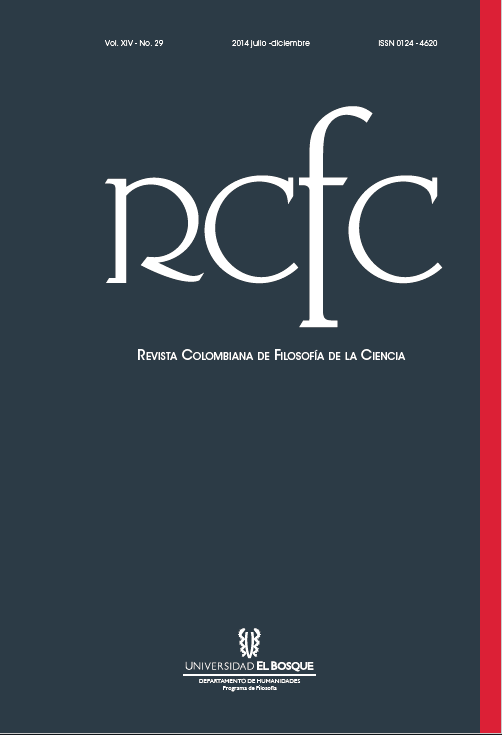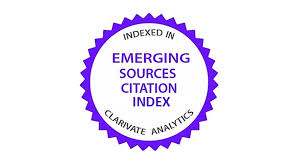La noción de poder causal
Consecuencias de diferentes teorías modales y causales
DOI:
https://doi.org/10.18270/rcfc.v14i29.661Palabras clave:
poder causal, causalidad, modalidad, disposiciónResumen
Este trabajo trata de clarificar la noción de poder causal. Se sostiene que un poder causal debe ser comprendido en relación con cuestiones más amplias de metafísica modal y de causalidad. Se describen cuatro teorías alternativas principales de concebirlo: (i) como proyección subjetiva de nuestra imaginación o de nuestras capacidades cognitivas de concebir algo, (ii) como resultado de la semejanza entre diferentes mundos posibles, (iii) como producto de la recombinación de entidades independientes entre sí, y (iv) como entidad primitiva, no reducible a otros estados de cosas más básicos. Se afirma que la adopción de una u otra de estas alternativas tiene consecuencias importantes en varios debates donde se ha usado la noción de poder causal.
Descargas
Referencias bibliográficas
Alvarado, José Tomás. “Una teoría causal de la modalidad”. Ideas y valores (2009): 140: 173-96.
Armstrong, David M. Universals and Scientific Realism. Vol. I Nominalism and Realism. Cambridge: Cambridge University Press, 1978.
—.Universals and Scientific Realism. Vol. II. A Theory of Universals. Cambridge: Cambridge University Press, 1978.
—. What is a Law of Nature? Cambridge: Cambridge University Press, 1983.
—. Universals. An Opinionated Introduction. Boulder: Westview, 1989.
—. A Combinatorial Theory of Possibility, Cambridge: Cambridge University Press, 1989.
—. A World of States of Affairs. Cambridge: Cambridge University Press, 1997.
Bird, Alexander. Nature´s Metaphysics. Laws and Properties. Oxford: Clarendon Press, 2007.
Black, Robert. “Against Quidditism”. Australasian Journal of Philosophy 78(2000): 87-104.
Blackburn, Simon. “Morals and Modals”. 1987. Metaphysics. An Anthology. Eds. Kim, Jaegwon y Ernest Sosa. Oxford: Blackwell, 1999. 634-48.
Borghini, Andrea y Neil Williams. “A Dispositional Theory of Possibility”. Dialectica 62 (2008): 21-41.
Chalmers, David. “Does Conceivability Entail Possibility?” Conceivability and Possibility. Eds. Wright, Crispin y Macdonald. Oxford: Clarendon Press, 2002. 145-200.
Collins, John, Ned Hall y L. A. Paul (eds.). Causation and Counterfactuals. Cambridge, Mass.: MIT Press, 2004.
Cross, Richard. “Medieval Theories of Haecceity” Stanford Encyclopedia of Philosophy, 2010 <http://plato.stanford.edu/entries/medieval-haecceity/>.
Dretske, Fred. “Laws of Nature”. Philosophy of Science 44 (1977): 248-68.
Ellis, Brian. Scientific Essentialism. Cambridge: Cambridge University Press, 2001.
Hawthorne, John. “Causal Structuralism”. 2001. Metaphysical Essays. Oxford: Clarendon Press, 2006. 211-27.
Jackson, Frank. From Metaphysics to Ethics. A Defence of Conceptual Analysis. Oxford: Clarendon Press, 1998.
Kim, Jaegwon. “Events as Property Exemplifications”. 1976. Supervenience and Mind. Selected Philosophical Essays. Cambridge: Cambridge University Press, 1993. 33-52.
Lewis, David. Counterfactuals, Oxford: Blackwell, 1973.
—. “Counterpart Theory and Quantified Modal Logic”. 1968. Philosophical Papers. Vol. I. Oxford: Oxford University Press, 1983. 26-46.
—. On the Plurality of Worlds, Oxford: Blackwell, 1986.
—. “Causation”. 1973. Philosophical Papers. Vol. II. Oxford: Oxford University Press, 1986. 159-172.
—. “Counterfactual Dependence and Time’s Arrow”. 1979. Philosophical Papers. Vol. II. Oxford: Oxford University Press, 1986. 32-66.
—. “New Work for a Theory of Universals”. 1983. Papers in Metaphysics and Epistemology, Cambridge: Cambridge University Press, 1999. 8-55.
—. “Causation as Influence”. 2000. Eds. Collins, Hall y Paul. Causation and Counterfactuals. Cambridge, Mass.: MIT Press, 2004. 75-106.
Lewis, David y Rae Langton. “Defining ‘Intrinsic’ ”. 1998. Lewis, D. Papers in Metaphysics and Epistemology. Cambridge: Cambridge University Press, 1999. 116-32.
Martin, Charles. “Dispositions and Conditionals”. Philosophical Quarterly 44 (1994): 1-8.
Mellor, D. H. The Facts of Causation. London: Routledge, 1995.
Molnar, George. Powers. A Study in Metaphysics. Oxford: Oxford University Press, 2003.
Mumford, Stephen. Dispositions. Oxford: Oxford University Press, 1998.
—. Laws in Nature. London: Routledge, 2004.
Plantinga, Alvin. The Nature of Necessity. Oxford: Clarendon Press, 1974.
Prior, Elizabeth, Robert Pargetter & Frank Jackson. “Three Theses about Dispositions”. American Philosophical Quarterly 19 (1982): 251-257.
Ramsey, Frank P. “General Propositions and Causality”. The Foundations of Mathematics and Other Logical Essays. Eds. R. B. Braithwaite. London: Routledge & Kegan Paul, 1931. 237-55.
Schaffer, Jonathan. “Quiddistic Knowledge”. Philosophical Studies 123 (2005): 1-32.
Shoemaker, Sydney. “Causality and Properties”. 1980. Identity, Cause, and Mind. Philosophical Essays, Oxford: Clarendon Press, 2003. 109-35.
—. “Causal and Metaphysical Necessity”. 1998. Identity, Cause, and Mind. Philosophical Essays, Oxford: Clarendon Press, 2003. 407-26.
Swoyer, Chris. “The Nature of Natural Law”. Australasian Journal of Philosophy 60 (1982): 203-23.
Santo Tomás de Aquino. De ente et essentia obtenido de Opera omnia, http://www.corpusthomisticum.org.
Tooley, Michael. “The Nature of Laws”. Canadian Journal of Philosophy 7 (1977): 667-98.
—. Causation. A Realist Approach. Oxford: Clarendon Press, 1987.
Descargas
Publicado
Cómo citar
Número
Sección
Licencia
Derechos de autor 2015 Revista Colombiana de Filosofía de la Ciencia

Esta obra está bajo una licencia internacional Creative Commons Atribución-NoComercial-SinDerivadas 4.0.

| Estadísticas de artículo | |
|---|---|
| Vistas de resúmenes | |
| Vistas de PDF | |
| Descargas de PDF | |
| Vistas de HTML | |
| Otras vistas | |











